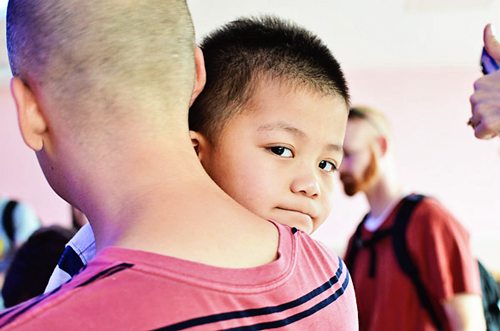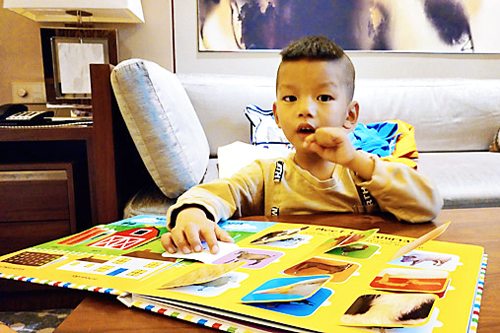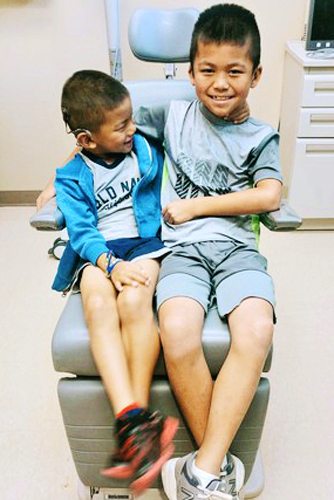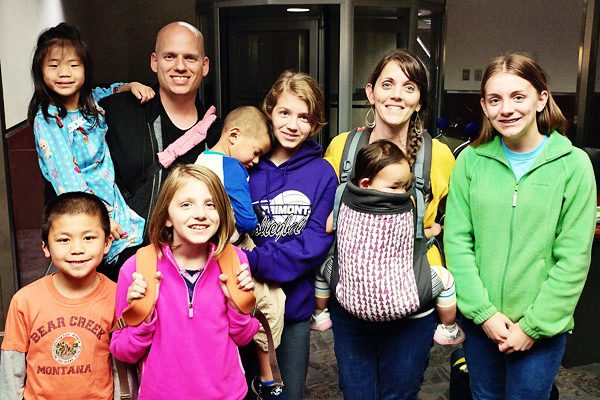We entered the deaf/hoh (hard of hearing) world three years ago when we adopted our first son. He was five years old with severe to profound hearing loss. His file stated that he was hard of hearing but could hear and talk with hearing aids. No big deal, we thought! If he can hear and talk we can do this! In the back of our minds we knew that his hearing loss might be worse than what was presented in his file, but we clung to the hope that he could hear and talk with help from his hearing aids.
While waiting to bring him home we began learning a little bit of sign language and researching deafness. We had moments of second guessing ourselves, but ultimately we knew he was our son and that we would do whatever was needed to help him.
Fast forward about 11 months. We were on our way to China for our little boy. The day of meeting was a whirlwind, but I can remember it like it was yesterday. He seemed to understand what was going on. He had the little photo book that we had made him. He also came to us with no hearing aids, no speech, and what seemed to be absolutely no hearing. We inquired about his hearing aids but they told us they were broken. No big deal, we thought. We were just going to get him new ones when we got home anyway.
After a few hours with him we knew he was a bright little kid that was ready to soak up language. Once he realized that these gestures we were doing meant something he quickly started signing and asking us to show him the signs for everything. Unfortunately we had not learned enough signs to keep up with him. That night, while in China, we immediately started taking online courses through Lifeprint. We quickly realized that this boy was going to need so much more than we were equipped for. The saying God doesn’t call the qualified, he qualifies the called, was really going to have to become true for us.

When we brought him home we explored every option. We met with a deaf tutor, scoured our county for deaf people, tried teaching family and friends sign language, went to multiple ENT and audiologist appointments and quickly realized the new hearing aids weren’t helping him. We also discovered the strong opinions in the Deaf community about cochlear implants, speech, sign language, etc. We were torn because there was such a divide on what the right thing to do is within the deaf/hoh community.
We desperately wanted do the right thing for our son. However, it took us some time to realize that the right thing for one deaf child may not be the right thing for another deaf child. A dear friend recommended that we watch One Deaf Child. We sat down to watch it one night. By the end of the film we were both sobbing. So many things resonated with us.
After watching that film we knew we had to give cochlear implants a try. Nine months after being home our son had surgery on his right ear and a month later it was activated. We didn’t have one of those magical activation videos like you see on YouTube. He was terrified at first, but he grew to enjoy new sounds over the coming weeks and months. We remember about a month after being activated, he heard the sound of a bird chirping outside, and he wanted to know what it was. Amazing!
We worked closely with our audio-verbal therapist who was able to help us know how to teach him to listen. His speech began improving significantly. We knew we had made the right decision. We’ve continued with English, using sign language when needed. He’s learning to read and write at home and is quickly catching up with his peers.
Just this past month, two years after his first implant, he made the decision to get his left ear implanted. Once again we did not have a magical activation video, but just a couple weeks later he’s starting to distinguish different sounds in that ear as well.
God followed through and equipped us, and we felt like God was telling us that we needed to bring home another child with hearing loss. He had followed through and now it was our turn to keep walking in faith.
In the fall of 2016 we headed back to China to bring home a three year old boy who also had profound hearing loss. We knew a significant amount of sign language, we knew all the specialists to go see, we had even learned a system called Cued Speech that helps deaf people learn the English language. We also knew that hearing aids would not help our new son. We knew that it would have to be cochlear implants (if eligible), Cued Speech or ASL or possibly all three! Whatever would help him we were willing to do.
The day we would meet him finally came and we were nervous, excited, scared, etc. All those feeling of insecurity were still there, even after learning so much. After four adoptions I don’t think those feelings will ever go away when meeting a new child. He was also scared but little toy cars enticed him to play with us.
We started with sign language right away since we knew we wanted to give him access to language as quickly as possible. His first sign was car and he loved looking out our hotel window, pointing and signing car.

Within a few months he was expressively using over 150 signs and receptively understood most of what we were signing. After he had a good grasp of toddler signs and could communicate all of his basic needs to us we moved on to using Cued Speech to convey English because we wanted to expose him to a language we were fluent in.
During this time we were also on track to get him bilateral cochlear implants. It took about six months from bringing home before he had surgery. He’s been implanted for seven months and with a lot of ups and downs, hard work and practice, with moments of almost giving up on listening and spoken language, he is now understanding almost all of what we say and he has about a dozen words that he uses consistently.
His progress was slow at first but has taken off at amazing speed over the last month. We feel like we are witnessing a miracle every day when he says Mama and Daddeeee!

Here are a few things, in no particular order, that we’ve learned about being parents to adopted deaf/hoh children:
• There is no one size fits all, one language fits all or one education fits all when it comes to deaf children.
• Do what’s best for your family as a whole. You are the only one who knows your family dynamics.
• No matter what mode of communication you choose you will be criticized. Don’t let it bother you! Something it took us a long time to learn (more me than my husband).
• You will meet lots of new, wonderful people.
• You’ll become more expressive.
• Don’t compare your child to other children with hearing loss or deafness. They all develop language at different speeds and in different ways.
• Many deaf adopted children have been deprived of language for many years which can lead to other developmental issues.
• Deaf children are not necessarily quiet! Be prepared for lots of noise in your house.
• Language input is never-ending! Input, input, input. Every waking hour.
• You will rejoice over every word signed or spoken.
• Others, most likely, will not learn sign language for your child.
• Your child will have to work twice, three…ten times as hard for what most parents and children take for granted.
• While it is an easy special need in some respects it is a life altering special need.
• It is not a quick fix special need. Deafness will be a part of their life and your life forever.
• You will learn so many things about language development.
• You will be amazed at how God created us to communicate and how that develops.
• Your will witness God working daily in your life and in your child’s life.
• You will love your child fiercely!
A few books we’ve read over the last few years that have helped us in our journey (disclaimer: all of these books are written from the perspective of parenting a non-adopted deaf/hoh child):
How Deaf Children Learn by Marc Marshark and Peter Hauser – This book shows that no matter what mode of communication you choose a deaf/hoh child can be successful with highly involved parents that have high expectations.
Cued Speech Resource Book for Parents of Deaf Children by Dr. Orin Cornett and Mary Elsie Daisy – A great resource book if you are wanting to learn more about Cued Speech, read real-life stories of others, and learn more about language development.
I Can Hear You Whisper: An Intimate Journey Through the Science of Sound and Language by Lydia Denworth – This was a personal story of a mom with a deaf child who went the cochlear implant route. She gives a lot of information about the history of cochlear implants and how they work along with her personal journey into why she chose cochlear implants for her son.
Websites that have been helpful:
Lifeprint – a great free resource to start learning sign language
Described and Captioned Media Programing – a place to find Cued Speech and ASL resources – it’s sort of like a library where you can check out items for free
Hands and Voices – Find your local chapter
National Cued Speech Association
Other resources:
Signing Time Videos – a great beginning step to learning sign language
One Deaf Child – Rachel Coleman’s Story
There are also many Facebook groups. If you are interested in more info on these please e-mail me.

I hope this post has been helpful to anyone considering deaf adoption. If you would like any more info about hearing loss, deafness, cochlear implants, cued speech, etc… Please e-mail me!
– guest post by Elizabeth

























Beautiful article! The only piece I would add is that there are “brands” other than the cochlear both for soft band Baha’s or implanting a device.
We chose Oticon Ponto pSP3 and it’s been a game changer. Again, wonderful article!
Cochlear is a company that makes different assistive devices, but ‘cochlear implants’ are a type of device for people with sensoneural hearing loss. BAHA devices, including the Ponto, are for kids with conductive hearing loss. Two companies, yes, but also two completely different types of products – with multiple manufacturers/brands! ☺️
Just what I needed to read today. We are waiting for travel approval on our 3rd international deaf/HOH adoption. The daughter we are waiting for has profound loss and we are going early to foster her so that we can establish (ASL) communication and work through the cochlear candidacy. Your blog made me feel less alone.
I liked reading about your experience. We adopted a 4-year old in 2016 who is deaf, and still feel like we are on the “slow track” with him. We have done and are doing everything we know to do to expose him to sign language and other deaf individuals, he has an interpreter and other help at school, and is 7 months “old” since his implants were activated. He still tries to get by without signing, and has not tried any new words yet. We are interested in adopting again, potentially another DHH child, but unsure if we are the “right” ones for the job. It’s been discouraging, even though we have seen great progress, it’s certainly doesn’t feel like much. Anyway, thank you for giving hope that many kids do love learning how to communicate in new ways! 🙂
I have an adopted 6 year old with profound hearing loss. We brought her home from the hospital when she was born. She is our joy. This is a great article. Please do not be afraid to adopt a child with hearing loss, they are wonderful little people who need someone who can love and be there to help them. In the end you will get as much happiness out of the adoption as the child. May God Bless these kids!
Hi my name is Azalia Sally casul and I’m deaf and my husband is deaf too and two son hard of hearing and I want adoption deaf little girl and I live in Syracuse ny